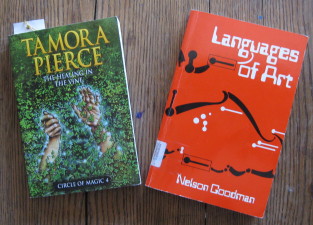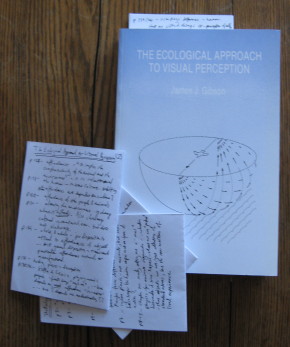In explaining how to make sentences more readable (I know I am one to talk!), I frequently explain to students that language understanding is a combination of a schema-based syntactic structure with more sequential associative reading. Only recently I realised this was also the way we had been addressing the issue of task sequence inference in the TIM project. and is related also to the way we interpret action in the real world.
Tag Archives: language
bookshelf in Rome
I posted a few weeks ago about books I had got to bring to Rome. Since then I got another small collection because I had done some reviewing for Routledge.

Mostly philosophy of the mind and materiality … the latter to help as we work on the DEPtH book on Physicality, TouchIT
- Shaun Gallagher, Dan Zahavi. The Phenomenological Mind: An Introduction to Philosophy of Mind and Cognitive Science, Routledge, 2007.
- John Lechte. Fifty Key Contemporary Thinkers: From Structuralism to Post-Humanism, 2nd Edition, Routledge, 2007.
- Jean-Paul Sartre. Being and Nothingnes: An Essay on Phenomenological Ontology, 1943. Routledge Classics, , 2nd Edition, 2003.
- Jay Friedenberg. Artificial Psychology, Routledge , 2008.
- Max Velmans. Understanding Consciousness, Routledge, 2009.
- Peter Carruthers. The Nature of the Mind, Routledge, 2003.
In fact, with these and the previous set I had far too many even for a month of evenings, and below you can see the books I actually brought.
As well as a selection from the academic books also some fiction/leisure reading, some old favourites and some new ones:
- How Green was My Valley, Richard Llewellyn – a Welshman has to read this :-/
- The Catcher in the Rye, J.D. Salinger – a classic I’ve never read
- More of the Good Life – the TV series was formative for me as a child, but 40 seemed so far away
- Lark Rise to Candleford, Flora Thompson – some years since I’ve read it last, and have been loving the TV series, but I don’t think it has stayed very close to the book!
- Nella Last’s War – this is the book that was the basis for the TV drama Housewife 49 and part of the Mass Observation that collected diaries from ordinary people across Britain during the Second World War.
- Ruth, Elizabeth Gaskill – another classic that I’ve not read yet!
- As I Walked Out One Midsummer Morning. Laurie Lee’s account of travelling in Spain in the run up to the Civel War. I read it in school for O’level.
- Swallowdale, Arthur Ransome – Couldn’t find Swallow’s an Amazons, I think one of the girls might have it on their shelves!
- The Shining Company, Rosemary Sutcliff – we have loads of her histroical novels for children. I find that good children’s writing is so much better than most adult books, which often feel they need to be incomprehensible to be good.
- The Growing Summer, Noel Streatfield – lovely story, children visiting a quirky old lady in west coast of Ireland.
- Hovel in the Hills, Elizabeth West – another book I’ve read many times, but not for many years. True story about a couple who buy an old house on a Welsh hillside.
In addition, but missing from the picture, is one I borrowed from my daughter, Tamara Pierce’s The Healing in the Vine, and one I’ve borrowed from Tiziana Catarci during my visit the Languages of Art.

So, two weeks in and how far have I got …
Well, been a little busy, two journal papers, a book chapter, an interfaces article, two 3 hour lectures to the masters students here, a seminar, reading thesis chapters and helping with two grant proposals … so not got very far through the bookshelf.
In fact, to be brutally honest, so far only finished the Tamora Pierce and nearly finished Gibson (just conclusions to go):

As you can see LOTS of notes on Gibson, I will write a very long blog sometime about this, but several others in line first!
But next week several train journeys, so may get through a few more books 🙂
Why did the dinosaur cross the road?
A few days ago our neighbour told us this joke:
“Why did the dinosaur cross the road?”
…
It reminded me yet again of the incredible richness of apparently trivial day-to-day thought. Not the stuff of Wittgenstein or Einstein, but the ordinary things we think as we make our breakfast or chat to a friend.
There is a whole field of study looking at computational humour, including its use in user interfaces1, and also on the psychology of humour dating back certainly as far as Freud, often focusing on the way humour involves breaking the rules of internal ‘censors’ (logical, social or sexual) but in a way that is somehow safe.
Of course, breaking things is often the best way to understand them, Graeme Ritchie wrote2:
“If we could develop a full and detailed theory of how humour works, it is highly likely that this would yield interesting insights into human behaviour and thinking.”
In this case the joke starts to work, even before you hear the answer, because of the associations with its obvious antecessor3 as well as a whole genre of question/answer jokes: “how did the elephant get up the tree?”4, “how did the elephant get down from the tree?”5. We recall past humour (and so neurochemically are set in a humourous mood), we know it is a joke (so socially prepared to laugh), and we know it will be silly in a perverse way (so cognitively prepared).
The actual response was, however, far more complex and rich than is typical for such jokes. In fact so complex I felt an almost a palpable delay before recognising its funniness; the incongruity of the logic is close to the edge of what we can recognise without the aid of formal ‘reasoned’ arguments. And perhaps more interesting, the ‘logic’ of the joke (and most jokes) and the way that logic ‘fails’, is not recognised in calm reflection, but in an instant, revealing complexity below the level of immediate conscious thought.
Indeed in listening to any language, not just jokes, we are constantly involved in incredibly rich, multi-layered and typically modal thinking6. Modal thinking is at the heart of simple planning and decision making “if I have another cake I will have a stomach ache”, and when I have studied and modelled regret7 the interaction of complex “what if” thinking with emotion is central … just as in much humour. In this case we have to do an extraordinary piece of counterfactual thought even to hear the question, positing a state of the world where a dinosaur could be right there, crossing the road before our eyes. Instead of asking the question “how on earth could a dinosaur be alive today?”, we are instead asked to ponder the relatively trivial question as to why it is doing, what would be in the situation, a perfectly ordinary act. We are drawn into a set of incongruous assumptions before we even hear the punch line … just like the way an experienced orator will draw you along to the point where you forget how you got there and accept conclusions that would be otherwise unthinkable.
In fact, in this case the punch line draws some if its strength from forcing us to rethink even this counterfactual assumption of the dinosaur now and reframe it into a road then … and once it has done so, simply stating the obvious.
But the most marvellous and complex part of the joke is its reliance on perverse causality at two levels:
temporal – things in the past being in some sense explained by things in the future8.
reflexive – the explanation being based on the need to fill roles in another joke9.
… and all of this multi-level, modal and counterfactual cognitive richness in 30 seconds chatting over the garden gate.
So, why did the dinosaur cross the road?
“Because there weren’t any chickens yet.”
- Anton Nijholt in Twente has studied this extensively and I was on the PC for a workshop he organised on “Humor modeling in the interface” some years ago, but in the end I wasn’t able to attend :-([back]
- Graeme Ritchie (2001) “Current Directions in Computer Humor”, Artificial Intelligence Review. 16(2): pages 119-135[back]
- … and in case you haven’t ever heard it: “why did the chicken cross the road?” – “because it wanted to get to the other side”[back]
- “Sit on an acorn and wait for it to grow”[back]
- “Stand on a leaf and wait until autumn”[back]
- Modal logic is any form of reasoning that includes thinking about other possible worlds, including the way the world is at different times, beliefs about the world, or things that might be or might have been. For further discussion of the modal complexity of speech and writing, see my Interfaces article about “writing as third order experience“[back]
- See “the adaptive significance of regret” in my essays and working papers[back]
- The absence of chickens in prehistoric times is sensible logic, but the dinosaur’s action is ‘because ‘ they aren’t there – not just violating causality, but based on the absence. However, writing about history, we might happily say that Roman cavalry was limited because they hadn’t invented the stirrup. Why isn’t that a ridiculous sentence?[back]
- In this case the dinosaur is in some way taking the role of the absent chicken … and crossing the Jurassic road ‘because’ of the need to fill the role in the joke. Our world of the joke has to invade the dinosaur’s word within the joke. So complex as modal thinking … yet so everyday.[back]
nice quote: Auden on language
Was thumbing through Brain Cantwell Smith’s “On the Origin of Objects”1, and came across the following quote:
“One notices, if one will trust one’s eyes, the shadow cast by language upon truth.”
Auden, “Kairos & Logos“
This reminded me of my own ponderings as a school child (I can still hear the clank of china as I was washing cups in the church at the time!) as to whether I would be able to think more freely if I knew more languages and thus had more words and concepts, or whether, on the contrary, my mind would be most clear if I knew no language and was thus free of the conceptual straitjacket of English vocabulary. Of course all shades of Sapir-Whorf (although I didn’t know the term at the time), and now I hold a somewhere in-between view – language shapes thought but does not totally contain it2. Is that the moderation of maturity, or compromise of age?
- Trying to decide whether to start it again, as Luke Church, who I met at the PPIG meeting in September, told me it was worthwhile persevering with even though somewhat oddly written![back]
- I discuss this a bit in my transarticulation essay and paths and patches book chapter.[back]
The Cult of Ignorance
Throughout society, media, and academia, it seems that ignorance is no longer a void to be filled, but a virtue to be lauded. Ignorance is certainly not a ‘problem’, not something to be ashamed of, but is either an opportunity to learn or a signal that you need to seek external expertise. However, when ignorance is seen as something not just good in itself, but almost a sign of superiority over those who do have knowledge or expertise, then surely this is a sign of a world in decadence.
Although it is something of which I’ve been aware for a long time, two things prompt to think again about this: a mailing list discussion about science in schools and a recent paper review.
The CPHC mailing list discussion was prompted by a report by the BBC on a recent EU survey on attitudes to science amongst 15-25 year olds. The survey found that around 1/2 of Irish and British respondents felt they “lacked the skills to pursue a career in science” compared with only 10% in several eastern European countries. The discussion was prompted not so much by the result itself but by the official government response that the UK science community needed to do more “to understand what excites and enthuses young people and will switch them on to a science future.” While no-one disagrees with the sentiment, regarding it as ‘the problem’ disregards the fact that those countries where scientific and mathematical education is not a problem are precisely those where the educational systems are more traditional, less focused on motivation and fun!
I have blogged before about my concerns regarding basic numeracy, but that was about ‘honest ignorance’, people who should know not knowing. However, there is a common attitude to technical subjects that makes it a matter of pride for otherwise educated people to say “I could never do maths” or “I was never good at science”, in a way that would be incongruous if it were said about reading or writing (although as we shall see below technologists do do precisely that), and often with the implication that to have been otherwise would have been somehow ‘nerdy’ and made them less well-balanced people.
Sadly this cult of ignorance extends also to academia.
 A colleague of mine recently had reviews back on a paper. One reviewer criticised the use of the term ‘capitalisation’ (which was in context referring to ‘social capital’) as to the reviewer word meant making letters upper case. The reviewer suggested that this might be a word in the author’s native language.
A colleague of mine recently had reviews back on a paper. One reviewer criticised the use of the term ‘capitalisation’ (which was in context referring to ‘social capital’) as to the reviewer word meant making letters upper case. The reviewer suggested that this might be a word in the author’s native language.
At a time when the recapitalisation of banks is a major global issue, this surely feels like culpable ignorance. Obviously the word was being used in a technical sense, but the reviewer was suggesting it was not standard English. Of course, ‘capital’ in the financial sense dates back certainly 300 years, the verb ‘capitalise’ is part of everyday speech “let’s capitalise on our success”, and my 30 year old Oxford English Dictionary includes the following:
Capitalize 1850. …. 2. The project of capitalizing incomes 1856. Hence Capitalization.
Now I should emphasise it is not the ignorance of the reviewer I object to; I know I am ignorant of many things and ready to admit it. The problem is that the reviewer feels confident enough in that ignorance to criticise the author for the use of the word … apparently without either (a) consulting a dictionary, or (b) while filling out the online review form bothering to Google it!
This reminded me of a review of a paper I once received that criticised my statistical language, suggesting I should use the proper statistical term ‘significance’ rather than the informal language ‘confidence’. Now many people do not really understand the difference between significance testing (evidence of whether things are different) and confidence intervals (evidence of how different or how similar they are) – and so rarely use the latter, even though confidence intervals are a more powerful statistical tool. However the problem here is not so much the ignorance of the reviewer (albeit that a basic awareness of statistical vocabulary would seem reasonable in a discipline with a substantial experimental side), but the fact that the reviewer felt confident enough in his/her ignorance to criticise without either consulting an elementary statistical text book or Googling “statistics confidence”.
So, let’s be proud of our skills and our knowledge, humble in accepting the limits of what we know, and confident enough in ourselves, so that we do not need to denegrate others for doing what we cannot. Then ignorance becomes a spring board to learn more and a launching point for collaboration
Thusly, he wrote
Was with Kiel, one of my PhD students the other day, reading a draft chapter of his PhD thesis. He used the word ‘thusly’ and at first I thought this was a Kiel-ism (sorry Kiel, you do have a few). However, he assured me it was common usage … and not just for him. I suspected it was a regional idiom and indeed a bit of web searching finds many archaic uses of thusly, but several more recent Lancashire uses.
I suspect the word arose because ‘thus’ often precedes a verb and so has acquired an adverb ‘-ly’ ending … a form of lexical over-generalisation. … and if you have not already stopped reading because you can’t understand why anyone would be even interested in this level of language … as I did the web search found a lovely discussion site called INTERACTION (and no, this one is not the synonymous BCS HCI Group) where one person mildly mocked another for using ‘thusly’ in the 21st Century … obviously not a Lancashire lad.
This has also made me reflect on my own frequent use of ‘thus’ to mean ‘therefore’ as opposed to ‘in this way’ … argh am I really a grammar nerd :-/
